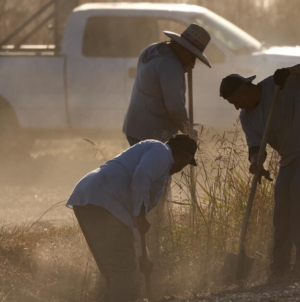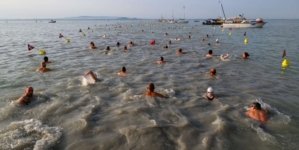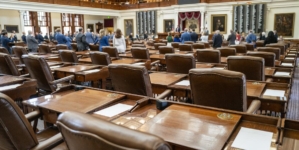-
DraftKings Promo Code: Upgraded $200 Bonus For MLB, NFL Preseason Continues - 11 mins ago
-
Man City Midfielder Rodri Dealing With Injury Setback Before Premier League Year - 20 mins ago
-
NBA Legend Doesn’t Hold Back About Fever Superstar Caitlin Clark - 50 mins ago
-
2025 NFC South Player Specials: Will Bryce Young Bounce Back in Carolina? - about 1 hour ago
-
Christie Brinkley shares unique marriage advice on recent podcast - about 1 hour ago
-
Caesars Sportsbook Promo Code NEWSWK2DYW: Get 10 MLB, NFL Preseason Boosts - about 1 hour ago
-
See the latest photos of first lady Melania Trump as she hits 200-day White House milesetone - 2 hours ago
-
2025 AFC South Player Specials: Will Top Rookies Dominate In Year 1? - 2 hours ago
-
Tom Hanks pays tribute to Apollo 13 astronaut Jim Lovell who died at 97 - 2 hours ago
-
Yankees’ Aaron Boone Explains Latest Indefensible Devin Williams Decision - 2 hours ago
‘Silence is violence’: Teachers, retirees, first-time activists stand up to immigration raids
“Thank you so much for showing up this morning,” Sharon Nicholls said into a megaphone at 8 a.m. Wednesday outside a Home Depot in Pasadena.
As of Friday afternoon, no federal agents had raided the store on East Walnut Street. But the citizen brigade that stands watch outside and patrols the parking lot in search of ICE agents has not let down its guard—especially not after raids at three other Home Depots in recent days despite federal court rulings limiting sweeps.
Steve Lopez
Steve Lopez is a California native who has been a Los Angeles Times columnist since 2001. He has won more than a dozen national journalism awards and is a four-time Pulitzer finalist.
About two dozen people gathered near the tent that serves as headquarters of the East Pasadena Community Defense Center. Another dozen or so would be arriving over the next half hour, some carrying signs.
“Silence is Violence”
“Migrants Don’t Party With Epstein”
Cynthia Lunine, 70, carried a large sign that read “Break His Dark Spell” and included a sinister image of President Trump. She said she was new to political activism, but added: “You can’t not be an activist. If you’re an American, it’s the only option. The immigration issue is absolutely inhumane, it’s un-Christian, and it’s intolerable.”

Anit-ICE activists march through the Home Depot in Pasadena on Aug. 6.
(Genaro Molina/Los Angeles Times)
There are local supporters, for sure, of Trump’s immigration crackdown. Activists told me there aren’t many days in which they don’t field shouted profanities or pro-Trump cheers from Home Depot shoppers.
But the administration’s blather about a focus on violent offenders led to huge demonstrations in greater Los Angeles beginning in June, and the cause continues to draw people into the streets.
Dayena Campbell, 35, is a volunteer at Community Defense Corner operations in other parts of Pasadena, a movement that followed high-profile raids and was covered in the Colorado Boulevard newspaper and, later, in the New York Times. A fulltime student who works in sales, Campbell was also cruising the parking lot at the Home Depot on the east side of Pasadena in search of federal agents.
She thought this Home Depot needed its own Community Defense Corner, so she started one about a month ago. She and her cohort have more than once spotted agents in the area and alerted day laborers. About half have scattered, she said, and half have held firm despite the risk.
When I asked what motivated Campbell, she said:
“Inhumane, illegal kidnappings. Lack of due process. Actions taken without anyone being held accountable. Seeing people’s lives ripped apart. Seeing families being destroyed in the blink of an eye.”
Anywhere from a handful to a dozen volunteers show up daily to to hand out literature, patrol the parking lot and check in on day laborers, sometimes bringing them food. Once a week, Nicholls helps organize a rally that includes a march through the parking lot and into the store, where the protesters present a letter asking Home Depot management to “say no to ICE in their parking lot and in their store.”
Nicholls is an LAUSD teacher-librarian, and when she asks for support each week, working and retired teachers answer the call.
“I’m yelling my lungs out,” said retired teacher Mary Rose O’Leary, who joined in the chants of “ICE out of Home Depot” and “No hate, no fear, immigrants are welcome here.”

Sharon Nicholls gets a hug of support from another protester outside the Home Depot in Pasadena.
(Genaro Molina/Los Angeles Times)
“Immigrants are what make this city what it is … and the path to legal immigration is closed to everybody who doesn’t have what, $5 million or something?” O’Leary said, adding that she was motivated by “the Christian ideal of welcoming the stranger.”
Retired teacher Dan Murphy speaks Spanish and regularly checks in with day laborers.
“One guy said to me, ‘We’re just here to work.’ Some of the guys were like, ‘We’re not criminals … we’re just here … to make money and get by,’” Murphy said. He called the raids a flexing of “the violent arm of what autocracy can bring,” and he resents Trump’s focus on Southern California.
“I take it personally. I’m white, but these are my people. California is my people. And it bothers me what might happen in this country if people don’t stand firm … I just said, ‘I gotta do something.’ I’m doing this now so I don’t hate myself later.”
Nicholls told me she was an activist many years ago, and then turned her focus to work and raising a family. But the combination of wildfires, the cleanup and rebuilding, and the raids, brought her out of activism retirement.
“The first people to come out after the firefighters—the second-responders—were day laborers cleaning the streets,” Nicholls said. “You’d see them in orange shirts all over the city, cleaning up.”
The East Pasadena Home Depot is “an important store,” because it’s a supply center for the rebuilding of Altadena, “and we’re going out there to show our love and solidarity for our neighbors,” Nicholls said. To strike the fear of deportation in the hearts of workers, she said, is “inhumane, and to me, it’s morally wrong.”
Nicholls had a quick response when I asked what she thinks of those who say illegal is illegal, so what’s left to discuss?
“That blocks the complexity of the conversation,” she said, and doesn’t take into account the hunger and violence that drive migration. Her husband, she said, left El Salvador 35 years ago during a war funded in part by the U.S.

Pablo Alvarado, right, co-director of National Day Laborer Organizing Network, speaks to Anti-ICE protesters on Aug. 6.
(Genaro Molina/Los Angeles Times)
They have family members with legal status and some who are undocumented and afraid to leave their homes, Nicholls said. I mentioned that I had written about Pasadena Mayor Victor Gordo, who was undocumented as a child, and has kept his passport handy since the raids began. In that column, I quoted Gordo’s friend, immigrant-rights leader Pablo Alvarado, director of the National Day Laborer Organizing Network.
“Full disclosure,” Nicholls said, “[Alvarado] is my husband.”
It was news to me.
When the raids began, Nicholls said, she told her husband, “I have the summer off, sweetie, but I want to help, and I’m going to call my friends.”
On Wednesday, after Nicholls welcomed demonstrators, Alvarado showed up for a pep talk.
“I have lived in this country since 1990 … and I love it as much as I love the small village where I came from in El Salvador,” Alvarado said. “Some people may say that we are going into fascism, into authoritarianism, and I would say that we are already there.”
He offered details of a raid that morning at a Home Depot in Westlake and said the question is not whether the Pasadena store will be raided, but when. This country readily accepts the labor of immigrants but it does not respect their humanity, Alvarado said.
“When humble people are attacked,” he said, “we are here to bear witness.”
Nicholls led demonstrators through the parking lot and into the store, where she read aloud the letter asking Home Depot to take a stand against raids.
Outside, where it was hot and steamy by mid-morning, several sun-blasted day laborers said they appreciated the support. But they were still fearful, and desperate for work.
Jorge, just shy of 70, practically begged me to take his phone number.
Whatever work I might have, he said, please call.
steve.lopez@latimes.com
Source link





























